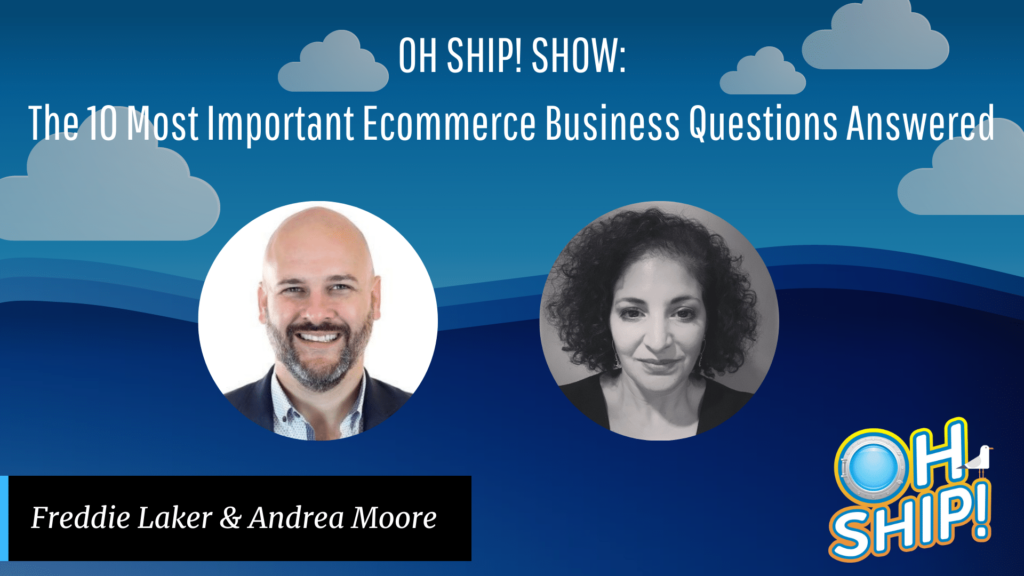Andrea and Freddie discuss their most pressing questions about the industry.
Andrea is SVP of digital and ecommerce at NEST New York, as well as an adjunct professor at the Fashion Institute of Technology. She has led ecommerce at various high-profile companies and has spent the last 20 years building ecommerce businesses for omnichannel retailers. In their conversation, Andrea and Freddie delved into the most important questions in the ecommerce space. Read on for essential insights on what the coming years will hold for ecommerce!
1. When building out a digital team, do you outsource or hire the talent internally?
“I think the answer is yes. I think you do both,” says Andrea. “I think you can get the most benefit by leveraging internal and external skill sets. Use outside resources when you’re just starting or need subject matter experts like data scientists; hire people for roles requiring lots of internal communication, she urges.
The mindset of hiring without borders has expanded access to talent. “I think it really democratizes hiring and allows you to get the best people for the best role regardless of where they are,” she says.
2. What do you think is more important: A retailer’s own dotcom or marketplaces like Amazon and Walmart?
Marketplaces are typically the greater revenue tool, even though CEOs and CFOs often want to prioritize the dotcom to avoid fees, says Freddie.
“The reality is, [a marketplace] is more convenient for customers in most cases, unless the brand can offer a better experience,” he explains. Marketplace sales often exceed dotcom sales by a factor of 10 or more, he notes.
Andrea concurs. “I think it’s such a big discovery tool for brands, too,” she says of Amazon. “It’s very hard to compete with Prime.”
“It’s not a question of either/or anymore. You must be on the marketplaces and have your own kind of flagship dotcom,” she asserts, adding that a business must balance what to offer on Amazon vs. specialty platforms.
3. How do you get the most out of your agency relationships?
“It’s really important to pick the right size agency for your business and your budget. Because if you pick an agency that’s too big, you’re not gonna get enough attention,” Andrea says. “If it’s too small, they’re not gonna be enough forward-thinking and [will] kind of have other businesses leading the way.”
Then, work to build relationships even before the contract is signed. “If you feel like you don’t have a company or a team at that company that you can be radically transparent with, you’re probably not with the right agency,” she says.
Your agency crew should be a true extension of your team. “I also think having the right team at an agency is critically important,” Andrea continues. “Don’t be afraid to switch.”
4. What’s the most important newer tactic for running a digital business, and what has been most underutilized?
“Media costs are rising, so it’s getting more and more expensive to get customers back into your site,” Freddie says. This makes SEO, email, paid media channels, and conversion-rate optimization increasingly important. Use A/B testing tools to decipher which version of a landing page performs best, he urges.
Most of us have gotten comfortable acquiring customers inexpensively over the past few years, says Andrea. “That is coming to a screeching halt. And we’ve gotta kind of go back to old-time values of really taking care of our existing customers and nurturing that second and third purchase,” she emphasizes. “That’s where CRO or conversion-rate optimization comes into play.” Get a solid tech partner to help you, she urges. “And I think with A/B testing, you kind of have to take some big swings,” she adds. This can help you gain traction faster.
5. What will be the most important ecommerce strategies for 2022?
Email is still the most effective mode of communicating with people, driving traffic and revenue, but SMS is up and coming, says Andrea. “Along the lines of engagement, I think SMS is by far the most important thing,” she asserts. “We’ve seen a massive migration toward SMS from email. That’s how they want to interact. They want to know when their product is shipping. They want to know when it’s being delivered. They want to reach out to a customer service associate. They want to get messages about what’s going on promotionally—and all of that through SMS.”
Then, diversify your marketing mix beyond Facebook and Instagram. Try out smaller marketplaces to offset the costs rising on the big ones, Andrea advises, noting that TikTok use is rising even among the 35+ crowd.
6. What is the most important thing to growing a global business, and what do people overlook or misunderstand about growing one?
Navigating regulations across borders has traditionally posed barriers for growing an international business. Larger companies have the advantage of scale here, says Freddie. But now, platforms like Shopify are simplifying global logistics. “Their secret sauce is understanding how to attack these different markets, how to deal with the compliance laws,” he explains. Today’s technologies are helping them break through these barriers at a much lower cost than 20 years ago.
7. What broader industry trends will emerge in 2022?
Supply chain issues will continue through next year, Andrea predicts. “I think it’s gonna really force companies to take a hard look at how they produce goods and how they get goods from point A to point B,” she asserts. The increasing costs of production, coupled with the global labor shortage, will continue affecting the prices and availability of goods. And the need for a marketing mix will keep everyone on their toes.
Privacy updates will make understanding consumer preferences more challenging, too. For instance, Apple has prevented apps from accessing customer data, and cookie deprecation is coming. This will force companies to find different strategies for understanding their audience.
8. What have you learned the most from things that haven’t worked out?
Freddie was trying to help a big organization turn its ecommerce marketing around. They were developing a proprietary headless ecommerce platform, which had a lot of technical interdependencies. But when you need to move fast, don’t try to reinvent the wheel, he learned.
The organization had ended up going down a technology rabbit hole when it should have used off-the-shelf solutions. Then, they could have applied their extra time and resources into optimization, he adds.
9. What’s the biggest lesson you’ve learned from an ecommerce failure?
Andrea was once working on a massive tech project with multiple vendors, lots of resources, and a hefty price tag in a short window of time. “I think the biggest mistake I made was accepting the mission upfront,” she asserts. “I should’ve said, ‘Hey, let’s take a step back and see if this is really even doable, and what are the real milestones, and what are we gonna hope to achieve?”
“A lot of tech companies are built to be agile, and a lot of businesses are not agile,” which can be hard to reconcile, she also notes.
Assume that a project will be 20% to 25% longer and more over-budget than you expected, she adds. “More time upfront, the planning part, is so critical.”
10. If you’re new to the market and don’t have unlimited resources, what’s the number one thing that you should be investing in for 2022?
“SEO all day long,” says Freddie. “Most people don’t have the patience for SEO.” He’s focusing on SEO for a side project he’s pursuing, and it doesn’t cost anything. “We’re using the revenue that we generated from nailing search engine optimization to fund the paid media, which is further accelerating the growth,” he notes.
There’s a gamified aspect of truly good SEO that can actually be fun, he adds. “It’s not about how you think; it’s about understanding how other people think.” Particularly in niche areas, smaller players can come out on top through strong SEO.
Did you enjoy this conversation? Subscribe and listen to the Oh Ship! show for more great insights from leading entrepreneurs!







